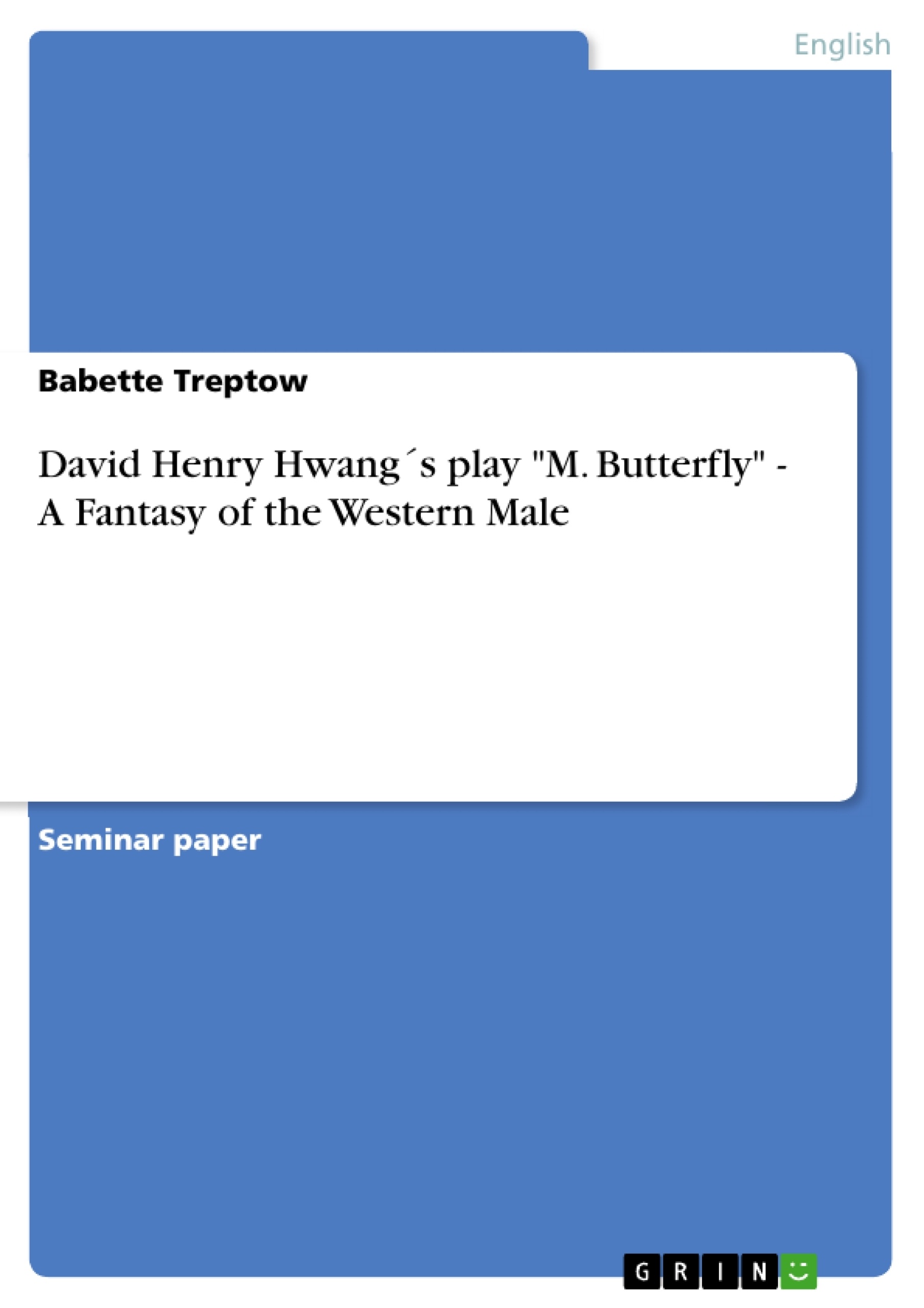1 Introduction
Modern-day drama is often considered to be an effective means of expressing criticism. Numerous contemporary playwrights experiment freely with dramatic conventions, and most works overtly demonstrate to be a piece of performance, so that the audience is alerted not to view reality but a play. Thus, the boundaries between authenticity (the ´natural`) and role playing (the ´artificial`) are blurred “in order to address the construction of social and political identity.” (Saddik 2007: 13).
David Henry Hwang´s play M. Butterfly (1988) can be regarded as one representative of that type of contemporary dramatic pieces. It demonstrates the construction of identity around the politics of gender, sexuality, power and race. In the course of the drama, the (biological male) character Song Liling constructs a female, Oriental fantasy for the French diplomat Rene Gallimard. By performing her1 ´race´ and gender according to Gallimard´s ideas about the Oriental, Song is able to disguise her male sex. For almost two decades, the French diplomat is not aware of the fact that his partner is not a woman but a man. (cf. Hwang 1988: 94ff.).
The drama M. Butterfly - the first Asian American play to be produced on Broadway - has been introduced in the course of last summer semester´s seminar Gender, Sexuality, ´Race` and Class in Contemporary American Drama. It aroused my interest not only due to its witty and provocative style, but also because of the drama´s fascinating and powerful but rather bizarre story about the relationship of a Western man and a perceived Chinese woman. I could not understand how Gallimard neither was nor, in the course of all their years together, became aware of his partner´s true sex.
Therefore, the term paper will have a closer look at Song´s and Rene´s affair, in order to figure out how the Chinese opera star is able to create a masquerade she can preserve for so many years. In this sense, the paper will deal with the following questions: How can Song deceive Gallimard for almost twenty years? How can she hide her true sex and hence begin an affair with the diplomat? What role do both protagonists´ racial backgrounds play with regard to this? What fascinates Gallimard about Song in the first place? And in this sense: What effect does Song´s Oriental identity have on Gallimard´s perception?
Table of Contents
- Introduction
- Orientalism
- Meaning of the term
- History of Orientalism
- Orientalism and Gender
- The Oriental Woman - A Fantasy of the Western Male in David H. Hwang's M. Butterfly
- David Henry Hwang - An Asian American Playwright
- M. Butterfly - A Short Summary of the Play
- Analysis of Hwang's M. Butterfly ……..
- Conclusion
Objectives and Key Themes
The term paper aims to analyze the relationship between the French diplomat Rene Gallimard and the Chinese opera star Song Liling, exploring how Song manages to maintain a masquerade for almost two decades and the role of their racial backgrounds in this dynamic. It seeks to answer questions about Song's ability to deceive Gallimard, her ability to hide her true sex, and the factors that initially fascinate Gallimard about her.
- Orientalism and its impact on Western perceptions of the East
- The construction of gender and identity in the play
- The role of power dynamics in shaping relationships
- The complexities of intercultural communication and misunderstanding
- The use of dramatic conventions to explore social and political issues
Chapter Summaries
The paper begins by defining the term “Orientalism” and its origins, providing a foundation for understanding its relevance to M. Butterfly. It then delves into the concept of “Orientalism” and its connection to “gender”.
Following this, the paper examines Asian American drama as a specific genre within contemporary American drama, leading to a brief overview of David Henry Hwang's career as a prominent playwright within this genre. A short summary of the play M. Butterfly is presented, providing context for the analysis that follows.
The analysis of M. Butterfly explores the central relationship chronologically, addressing the questions outlined earlier.
Keywords
The main keywords and focus topics of the paper include Orientalism, gender, identity, power, race, intercultural communication, Asian American drama, and David Henry Hwang's M. Butterfly.
Frequently Asked Questions
What is the central theme of David Henry Hwang's play "M. Butterfly"?
The play explores the construction of identity through the politics of gender, sexuality, power, and race, specifically focusing on Western fantasies of the "Oriental" woman.
How does Song Liling deceive Rene Gallimard for 20 years?
Song performs a version of "Oriental" femininity that aligns with Gallimard's Western stereotypes, allowing Song to hide his male sex behind a carefully constructed cultural masquerade.
What role does "Orientalism" play in the story?
Orientalism provides the framework of Western prejudices and fantasies that Gallimard projects onto Song, making him blind to the reality of Song's identity.
Is "M. Butterfly" based on a true story?
Yes, the play is inspired by the real-life affair between a French diplomat and a Chinese opera singer who was later revealed to be a spy and a man.
What does the title "M. Butterfly" signify?
The title references Puccini's opera "Madama Butterfly" but subverts it, using the "M." to blur the gender of the protagonist and critique the tragic trope of the submissive Asian woman.
- Quote paper
- Babette Treptow (Author), 2011, David Henry Hwang´s play "M. Butterfly" - A Fantasy of the Western Male, Munich, GRIN Verlag, https://www.grin.com/document/187523



